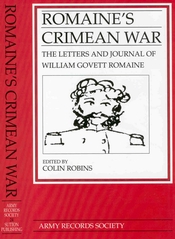Click here to view a text extract from this publication
 The Crimean War (1854-56) between the United Kingdom, France and the Ottoman Empire on the one hand, and Russia on the other, has become notorious for the poor administration and bad generalship suffered by the British forces. Four-fifths of their deaths were due, not to enemy action, but to sickness and disease. The generals cannot escape responsibility for the bad administration and are, of course, directly responsible for the mistakes in command and poor leadership. Contemporary writers so far published were either outside headquarters and badly informed, or on the Commander-in-Chief’s staff but anxious to portray their master in as good a light as possible. The discovery, therefore, of papers – a journal and many letters – written by a key member of the staff of Lord Raglan and his successors throws new light on events.
The Crimean War (1854-56) between the United Kingdom, France and the Ottoman Empire on the one hand, and Russia on the other, has become notorious for the poor administration and bad generalship suffered by the British forces. Four-fifths of their deaths were due, not to enemy action, but to sickness and disease. The generals cannot escape responsibility for the bad administration and are, of course, directly responsible for the mistakes in command and poor leadership. Contemporary writers so far published were either outside headquarters and badly informed, or on the Commander-in-Chief’s staff but anxious to portray their master in as good a light as possible. The discovery, therefore, of papers – a journal and many letters – written by a key member of the staff of Lord Raglan and his successors throws new light on events.William Govett Romaine was Deputy Judge-Advocate to the Army of the East, the senior civilian at headquarters, called the ‘eye of the army’ by Raglan, quoted by Kinglake as source for the chronology of actions in the Battle of Alma, and regarded by the editor of The Times as a better source than the official despatches.
Romaine took a keen interest in all aspects of the campaign, touring the field of operations and recording significant events. He was on familiar terms with all the staff and recorded many of their comments. His letters include his frank judgements – sometimes savage – on the conduct of the campaign and the quality of individual officers. In talks with Peninsular veterans he even sheds new light on why Blucher was late arriving at Waterloo! The senior officer who shirked physical danger, exaggerated a tiny injury and was evacuated to England where he obtained a ‘plum’ post is named, and his behaviour is contrasted with that of his fellows. And so on. Romaine’s papers are of the utmost importance to any study of the Crimean War.